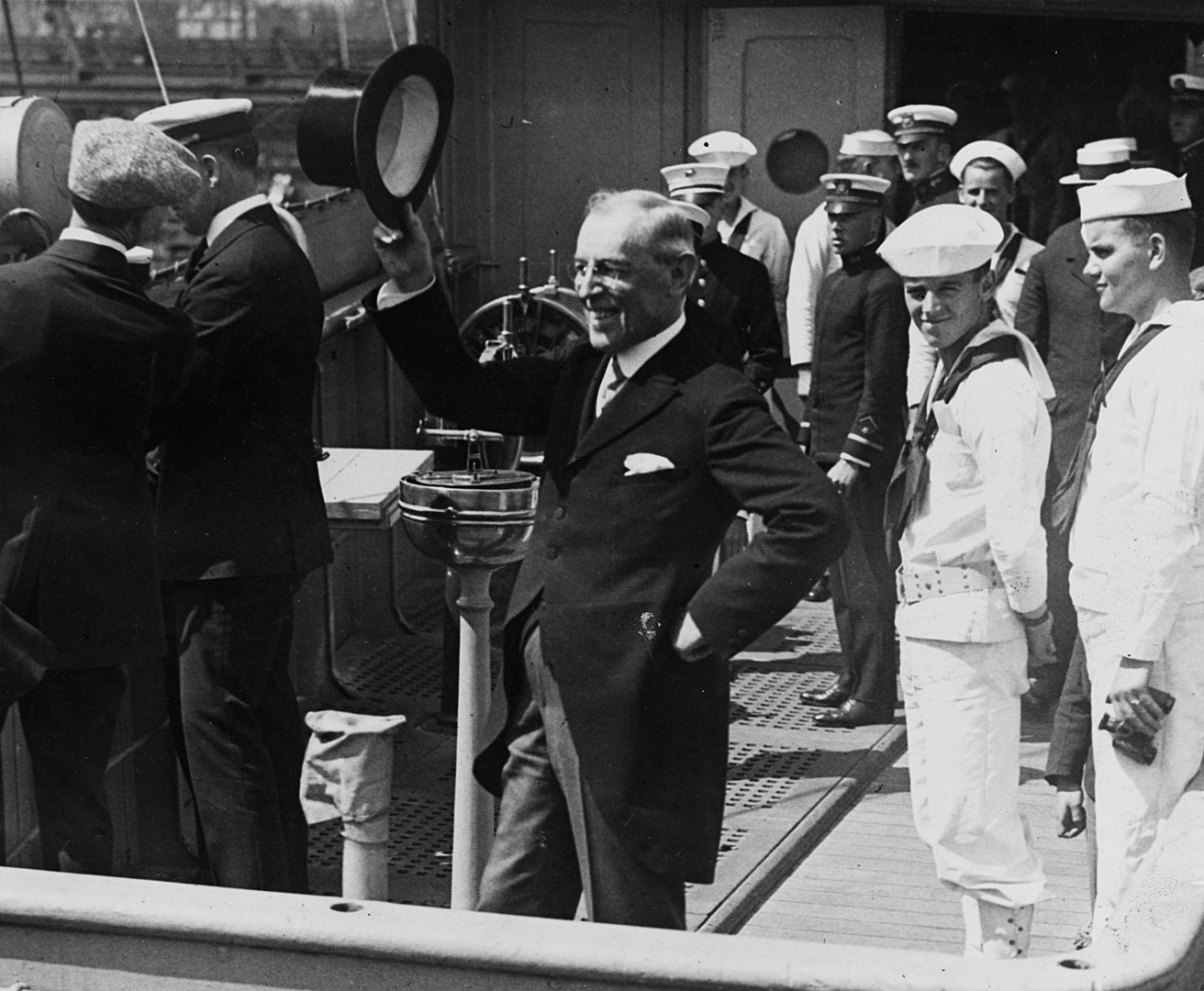
Woodrow Wilson’s Emancipatory Perspective: The Ottoman and Habsburg Empires
By Larry Wolff
With the dissolution of the Habsburg monarchy at the conclusion of World War I, American President Woodrow Wilson contributed to the creation of a new geopolitical order in Eastern Europe when he participated in refashioning the region as an interlocking set of supposedly national states at the Paris Peace Conference in 1919. Wilson’s scathing condemnation of the monarchy was politically unproblematic by then, as the demise of the imperial-royal Habsburg state had already occurred. In fact, Wilson only arrived at this condemnation during the last year of the war. The United States declared war against the Habsburg monarchy in December 1917—eight months after the declaration of war against Germany—and, for most of 1918, Wilson hesitated to oppose the continued existence of the monarchy. The Fourteen Points speech of January 1918 called for the autonomy, but not the independence, of the Habsburg peoples, thus implicitly affirming the sovereignty of the Habsburg state. Furthermore, Wilson seemed briefly open to the possibility of a separate peace with Vienna—a hypothetical diplomatic coup that would very likely have preserved the integrity and sovereignty of the Habsburg state. It was not until October 1918, with the war in its final weeks, that Wilson finally reached a more unequivocal condemnation of the Habsburg monarchy that countenanced its political abolition.[1]
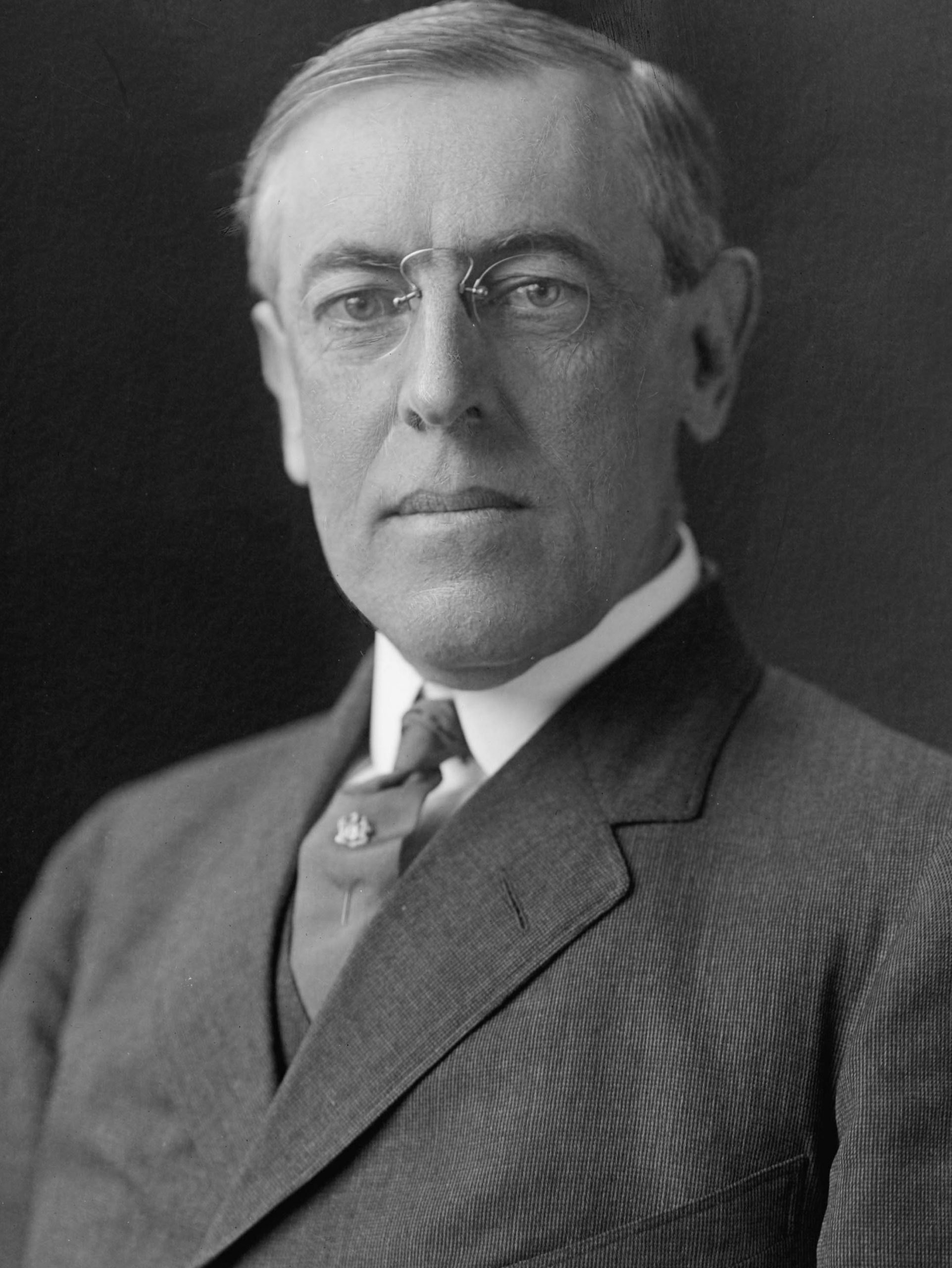
Woodrow Wilson. From the Harris & Ewing collection at the Library of Congress.
As Wilson was opposed, in general, to imperial states, an anti-Habsburg perspective was always ideologically plausible for him. The American war against Germany was accompanied by wholesale condemnation of German imperial ambitions to dominate “Mitteleuropa.” Wilson was also politically antipathetic to the tsarist Russian Empire, tentatively approving the earlier stages of the Russian Revolution as a move away from despotism toward democracy. Yet Wilson’s oldest and most deeply rooted anti-imperial perspective touching upon the region of Eastern Europe was directed against the Ottoman Empire.
When Wilson was an undergraduate student at Princeton, he followed Britian’s engagement with Ottoman affairs with some interest, and gave his highest approval to the British Liberal leader William Gladstone, whom he regarded as “the greatest statesman that ever lived.”[2] Gladstone’s moralistic liberalism and earnest Christian piety generally appealed to the young Wilson and shaped his future political outlook.
Here it is important to note that, for Gladstone, the crucial political issue of the later 1870s—from the beginning of the Eastern Crisis of 1876—was a fierce Liberal and Christian condemnation of the Ottoman Empire. This crystallized around the Bosnian and Bulgarian risings against the empire in the 1870s and took written form in Gladstone’s famous pamphlet of 1876, “Bulgarian Horrors and the Question of the East.” He condemned the massacre of Bulgarians by Ottoman irregular troops, the notorious “bashi-bazouks,” and called for the cancellation of Ottoman sovereignty in Bulgaria and southeastern Europe: “Let the Turks now carry away their abuses in the only possible way, namely by carrying off themselves. Their Zaptiehs and their Mudirs, their Bimbashis and their Yuzbachis, their Kaimakams and their Pashas, one and all, bag and baggage shall, I hope, clear out from the province they have desolated and profaned.”[3] Gladstone was staking out, in pioneering fashion, a rhetorically elaborate moral position on foreign policy, one he would take to the British electorate in the Midlothian campaign of 1879-1880, waging political war against Benjamin Disraeli, his political arch-rival. Disraeli believed that the preservation of the Ottoman Empire was strategically consistent with British interests in the Middle East and India, and, in the policy tradition of the Crimean War, sought to support the Ottomans against rivalrous Russian ambitions.
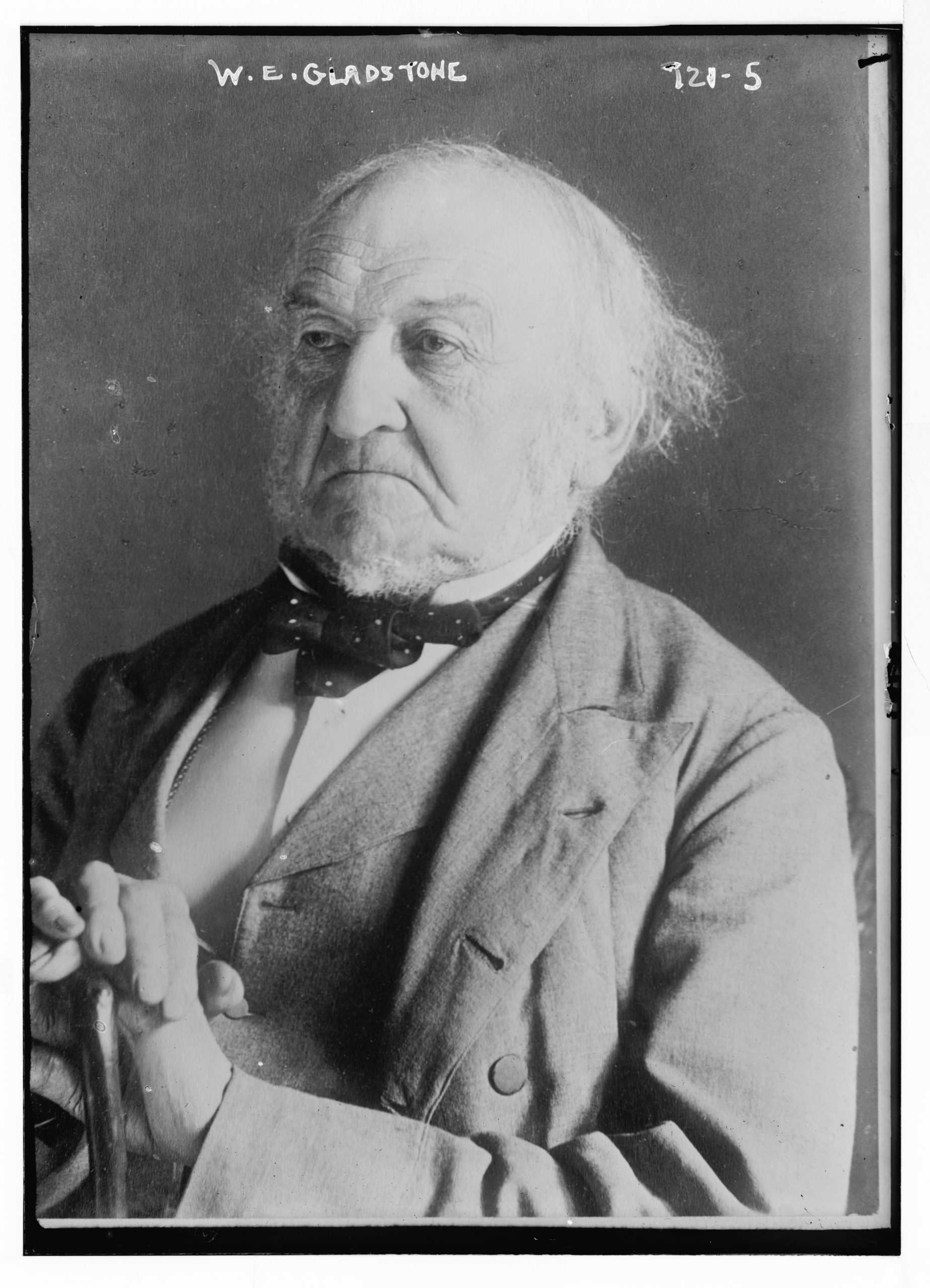
William Gladstone
Gladstone’s introduction of rhetorical moralism concerning foreign policy into British domestic politics in the 1870s in some ways anticipated the moral fervor with which Wilson, in 1919, would bring his campaign for the League of Nations before the American public. In the 1870s, however, the Eastern Question helped to make the young Wilson into a lifelong Gladstonian while it inculcated in him an inveterate prejudice against the Ottoman Empire. Hostility to the Ottomans became the initial strand of Wilson’s anti-imperial convictions during a period when he seemed to hold no strong opinions about the Habsburg monarchy. When he attempted to learn more about the Habsburg state as president during World War One, and then went to war with the Habsburgs from December 1917, it was the Ottoman Empire which served as a reference point for the gradual evolution of Wilson’s anti-Habsburg perspective.
In December 1912, immediately after his election to the presidency, and at the moment of the Balkan Wars, Wilson and his closest adviser Colonel Edward House discussed sending Henry Morgenthau as ambassador to the sultan in Constantinople (Istanbul), and Wilson commented jocularly, “There ain’t going to be no Turkey.”[4] It was an informal, even colloquial, remark (recorded in House’s diary), coming at the moment of the First Balkan War, but it indicated not just Wilson’s readiness to disparage the Ottomans, but, more notably, his casual contemplation of the non-existence of the empire, its hypothetical cancellation in what would have constituted a radical reordering of the world map—a reordering which would indeed take place in the aftermath of World War One.
With that war under way, in January 1917—before America’s entry into the war, but with America engaged in mediating efforts among the belligerents—Wilson discussed with House what sort of territorial alterations might allow for the conclusion of a negotiated peace. House again recorded the conversation in his diary: “We thought that since Germany and Russia had agreed to free Poland that should be put in. We naturally agreed upon Belgium and Serbia being restored. Alsace and Lorraine we were not quite certain of, but we agreed that Turkey should cease to exist.”[5] Wilson, with his Gladstonian formation, could easily contemplate the abolition of the Ottoman Empire.

Mehmed VI Vahideddin
Gladstone’s rhetorical conjuring of unfamiliar and disorienting Ottoman terms and titles—“their Zaptiehs and their Mudirs, their Bimbashis and their Yuzbachis, their Kaimakams”—offered Wilson a path toward articulating his disapproval of the Ottoman Empire as a matter of ethnographic complexity and confusion. In a conversation in Washington with the Belgian ambassador Baron Ludovic Moncheur, in August 1917, Wilson observed that “Turkey, that mass of different races, is a veritable hornet’s nest which keeps Europe always in alarm.”[6] It was an ugly entomological metaphor but pointed toward what would soon become Wilson’s crucial principle for the reordering of Europe—that is, the principle of geopolitical clarity based on the sorting of diverse peoples into distinct sovereignties. The geopolitical unmixing of races was for him also a principle of stability, since any “mass of different races” was a hornet’s nest, susceptible to being aroused or provoked into dangerously angry conflict.
Wilson was not using the term “race” with any great precision, and while it might have some of the aspects of racial thinking consistent with his own American context, it carried an assortment of meanings that could also signify ethnicity and nationality. One of the things he found disturbing about empires—the Ottoman Empire in this case—is that they contained a combination of diverse peoples. Wilson was born in 1856 in the slaveholding state of Virginia before the Civil War, and then came of age in America during the great period of immigration, when the huddled masses of diverse peoples were transposed to America, largely from Europe. This signified a transformation of American society that Wilson himself, like many members of the established American elite, regarded with some concern.
In October 1917 he discussed the post-war future of Turkey with House, and, according to House’s diary, was prepared to view “race” as an organizing political principle: “We spoke of the Italian campaign and the campaign in Asia Minor, and the partition or non-partition of Turkey. . . He [Wilson] thought he should say that Turkey should become effaced, and that the disposition of it should be left to the peace conference. Without advising that I thought it advisable to make such a speech now, I added that if it was made, it should be stated that Turkey must not be partitioned among the belligerents, but must become autonomous in its several parts according to racial lines. He accepted this addenda.”[7]
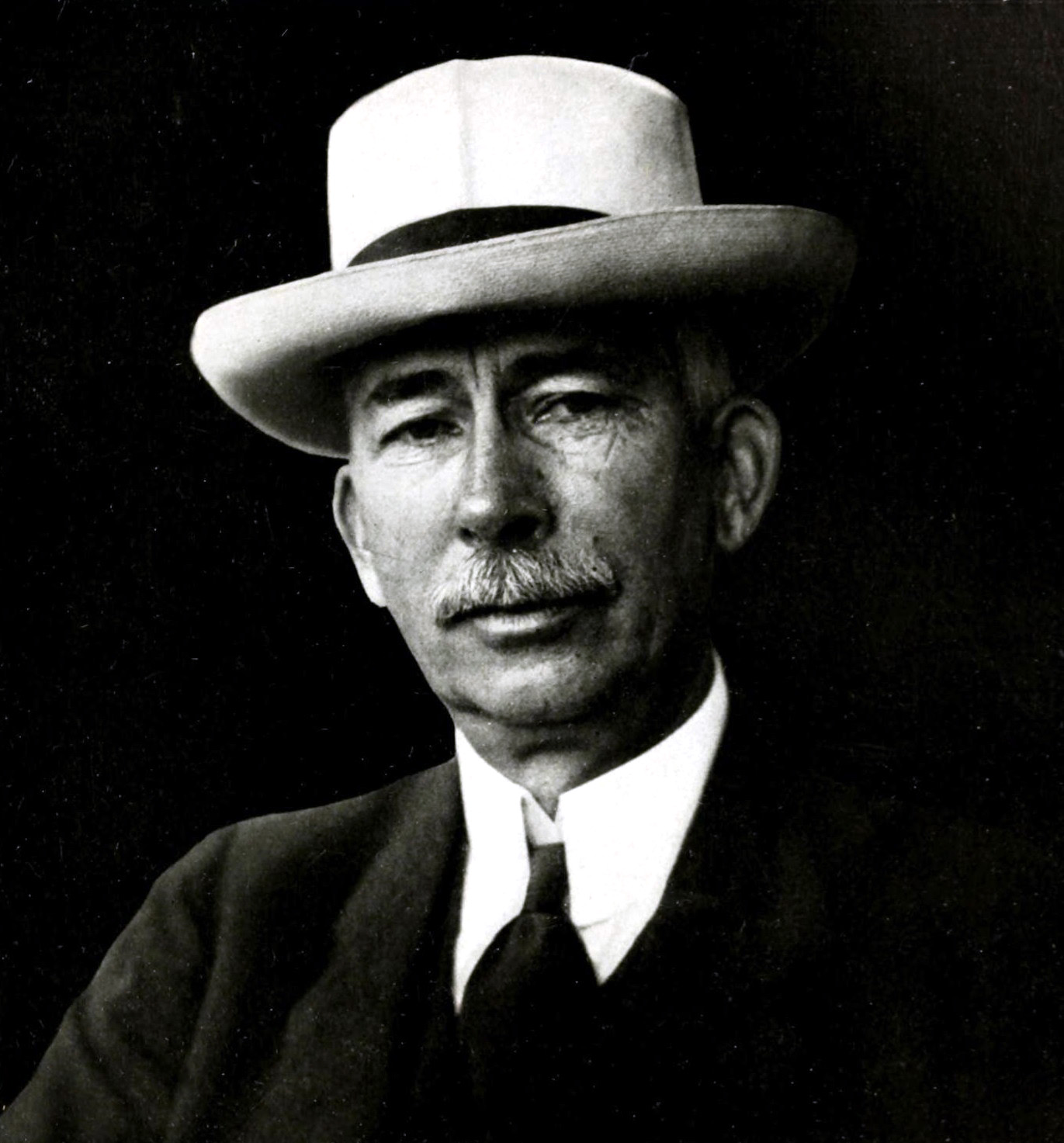
Colonel Edward M. House
Wilson’s almost reflexive reaction to any discussion of Turkey was to propose its abolition—“that Turkey should become effaced”—while House took a more detailed interest in the nature of that effacement. “Partition” was a term that would come to signify for Wilson the immoral aspects of traditional European diplomacy, a diplomacy based on territorial ambition and depredation—as in the eighteenth-century partitions of Poland by its neighbors—but, here, rather than partition, House and Wilson agreed that the effacement of the Ottoman Empire could be realized via dismemberment from within, following a principle of autonomy “according to racial lines.”
In Wilson’s State of the Union address on December 4, 1917—three days before the long-delayed declaration of war against Austria-Hungary—he insisted that “we do not wish in any way to impair or to rearrange the Austro-Hungarian Empire,” and affirmed that “it is no affair of ours what they do with their own life, either industrially or politically.”[8] The abolition of the Habsburg monarchy, at this moment, played no part in his stated agenda. In that same speech, he took a more active and invasive view of the future of the Ottoman Empire (though America was not at war with the Ottomans, and, in fact, would never declare war against them): “We shall hope to secure for the peoples of the Balkan peninsula and for the people of the Turkish Empire the right and opportunity to make their own lives safe, their own fortunes secure against oppression or injustice and from the dictation of foreign courts or parties.”[9] Wilson did not advocate publicly for the abolition of the Ottoman Empire (as he did sometimes in private comments), but neither did he hesitate to advocate the rearrangement of the empire, to insist, on behalf of the peoples of the empire, on “the right and opportunity to make their own lives safe,” to protect them from “oppression and injustice.” This was very different from the declaration of reserve—“it is no affair of ours”—with respect to the internal affairs of the Habsburg monarchy.
Yet the State of the Union address also created an alignment of the Ottoman and Habsburg Empires by affirming the rights of both sets of peoples to independence from the German domination that was considered implicit in the wartime alliance of Germany, Austria-Hungary, and the Ottoman Empire. “The peace,” declared Wilson, “must deliver the peoples of Austria-Hungary, the peoples of the Balkans, and the peoples of Turkey, alike in Europe and in Asia, from the impudent and alien dominion of the Prussian military and commercial autocracy.”[10] Here he said nothing about delivering those people from the dominion or autocracy of their own Habsburg and Ottoman governments, but rather from the foreign domination of their Prussian-German ally, from the autocratic rule of Berlin. It would, however, require only a small rhetorical adjustment to make the much larger political leap of advocating for the delivery of those same peoples from their own governments in Vienna and Constantinople.
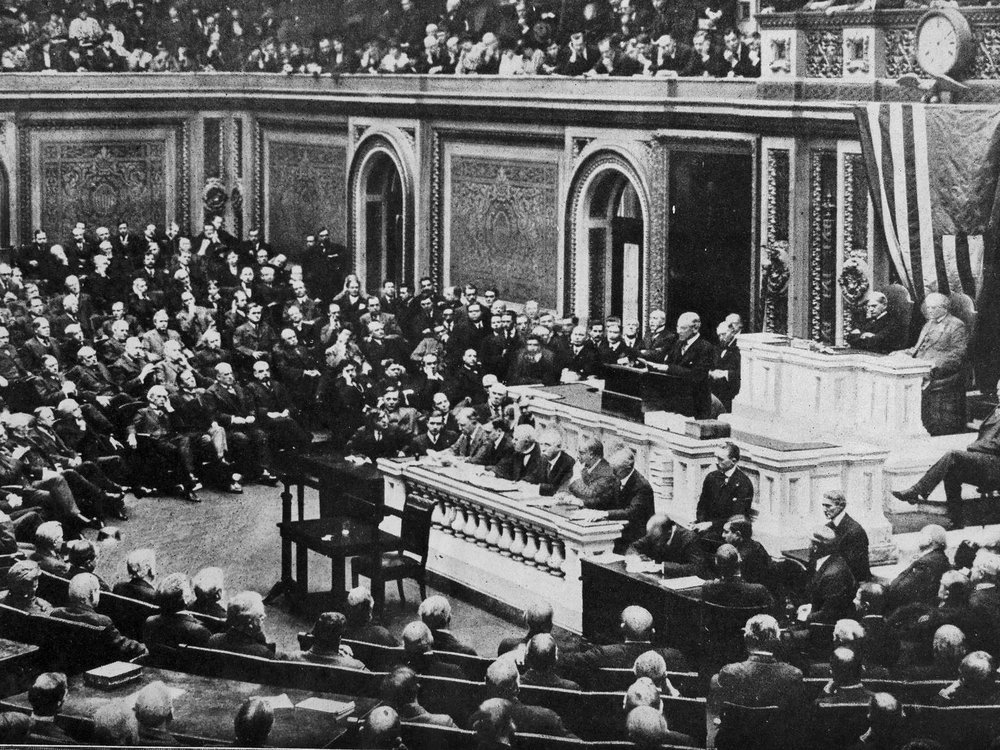
President Wilson, US Congress.
By the time Wilson delivered his famous Fourteen Points speech on war aims on 8 January 1918, he was ready to articulate an alignment of policy toward the Habsburg and Ottoman Empires with respect to their own peoples. This alignment was pursued in parallel points of the address, Point Ten on the Habsburg monarchy and Point Twelve on the Ottoman Empire. Point Ten declared that “The peoples of Austria-Hungary, whose place among the nations we wish to see safeguarded and assured, should be accorded the freest opportunity of autonomous development.” Point Twelve insisted that, besides the Turks themselves, “the other nationalities which are now under Turkish rule should be assured an undoubted security of life and an absolutely unmolested opportunity of autonomous development.” Though separated by Point Eleven (which formed a geographical bridge between the Habsburg and Ottoman Empires, affirming “the political and economic independence and territorial integrity of the several Balkan states”), Points Ten and Twelve aligned the Habsburg and Ottoman cases through the common principle of “autonomous development” for the diverse peoples of those empires.[11] This was an ethnographic affirmation of national communities which, while here applied within the geopolitical framework of the prewar imperial states, would be ultimately modified to allow for the abolition of the empires and the independence of new national states.
It should be noted that Point Ten contained a notorious pronoun problem, which was noted by some at the time: “the peoples of Austria-Hungary, whose place among the nations we which to see safeguarded.” Did “whose” refer to Austria-Hungary (its place among the nations to be safeguarded) or did it refer—much more radically—to “the peoples” themselves (their place to be safeguarded, alongside the other nations of Europe)? The latter interpretation, which more strongly implied the possibility of national independence, was later unofficially indicated by Wilson himself as his own preferred grammatical meaning. [12]
On February 11, one month after the Fourteen Points address, Wilson gave a speech to the United States Congress, in which he articulated basic principles underlying the war aims of the Fourteen Points. These principles seemed to radicalize the earlier affirmation of autonomous development, and they seemed to apply implicitly to the Habsburg monarchy. Wilson proposed that “national aspirations must be respected; peoples may now be dominated and governed only by their own consent”—and that self-determination was “an imperative principle of action.” The social contract reasoning of this principle, with government legitimated only by consent, seemed to allow for the possibility of the dissolution of empires. Wilson further reinforced this suggestion by articulating the principle that “all well-defined national aspirations shall be accorded the utmost satisfaction that can be accorded them without introducing new or perpetuating old elements of discord and antagonism.”[13] The notion of “utmost satisfaction” of national aspirations suggested that “autonomous development” might now possibly take its most extreme form, namely political independence—though Wilson acknowledged with great prescience that the utmost satisfaction for some nations might generate discord and antagonism involving other nations. Already in February 1918, he seemed to understand that he needed some sort of balance between national satisfactions and national resentments, and that the former might be likely to generate the latter. This insight would eventually, a year later at the peace conference, help Wilson to discover the importance of minority rights as the corollary of national self-determination.
Perhaps the most striking rhetorical flourish of Wilson’s February 11 speech was his characterization of World War One as “this war of emancipation—emancipation from the threat and attempted mastery of selfish groups of autocratic rulers.”[14] The whole war was thus conceived as a political crusade with an emancipatory purpose, harnessed to the war aims that had already been articulated in relation to a future peace settlement. Emancipation could mean many things at the beginning of the twentieth century, but it was not merely a synonym for liberation; the nineteenth century movements for Jewish emancipation and women’s emancipation signified the achievement of full civil rights. In the nineteenth-century American context, however, the word was also closely associated with the Civil War and Abraham Lincoln’s emancipation of the Southern slaves. Wilson’s two terms in the White House from 1912 to 1920 coincided precisely with the construction of the Lincoln Memorial on the Mall in Washington, and, though Wilson was born in Virginia in 1856 and spent his early childhood in the Confederacy, he was well aware of Lincoln’s legacy in the early twentieth century. Indeed, he partly contributed to the undoing of that legacy when the federal government bureaucracy became more purposefully segregated under the Wilson administration. Yet Wilson was interested in applying some of the emancipatory rhetoric of the Civil War to his own European war, and eventually he would label the nations of Eastern Europe as “enslaved” peoples, nationally enslaved by autocratic empires, and therefore in need of messianic emancipation. Thus Wilson partly extended, partly confused, and partly effaced the legacy of Lincoln’s Civil War, by reconceiving of World War One as a “war of emancipation” on behalf of enslaved peoples.
This rhetoric of emancipation allowed Wilson to bring the Ottoman and Habsburg cases into even closer alignment during the war’s final year and then at the peace conference. Midway through the Paris Peace Conference, Wilson made a trip to the US in late February and stayed long enough to deliver a speech at the Metropolitan Opera House in New York on March 4, 1919. He was already anticipating the need to campaign for the League of Nations. He declared to the audience at the opera house, “The liberated peoples of the Austro-Hungarian Empire and of the Turkish Empire call out to us for this thing [the League].” Thus the peoples of the Habsburg and Ottoman Empires, speaking through him, cried out in unison from their respective post-imperial spheres. His intimate sense of solidarity with those peoples enabled him to communicate their sufferings to the American public: “The nations that have long been under the heel of the Austrian, that have long cowered before the German, that have long suffered the indescribable agonies of being governed by the Turk, have called out to the world, generation after generation, for justice, for liberation, and for succor.”[15] Here the Austrians, Germans, and Turks were aligned as oppressors, and the nations of Eastern Europe were aligned as their victims, all suffering the same burden of national oppression, with Ottoman subjects particularly suffering “indescribable agonies.” Wilson was aware of the genocidal massacre of the Armenians which had taken place in 1915, publicized partly by the American ambassador in Constantinople, Henry Morgenthau. Wilson was certainly aware of the ways that the war itself had greatly aggravated national sufferings and dissatisfactions within the empires, but he insisted upon a rhetorically hyperbolic conception of Eastern Europe that featured nations imprisoned in a timeless imperial captivity—”generation after generation”—awaiting liberation, or emancipation, by his own intervention.
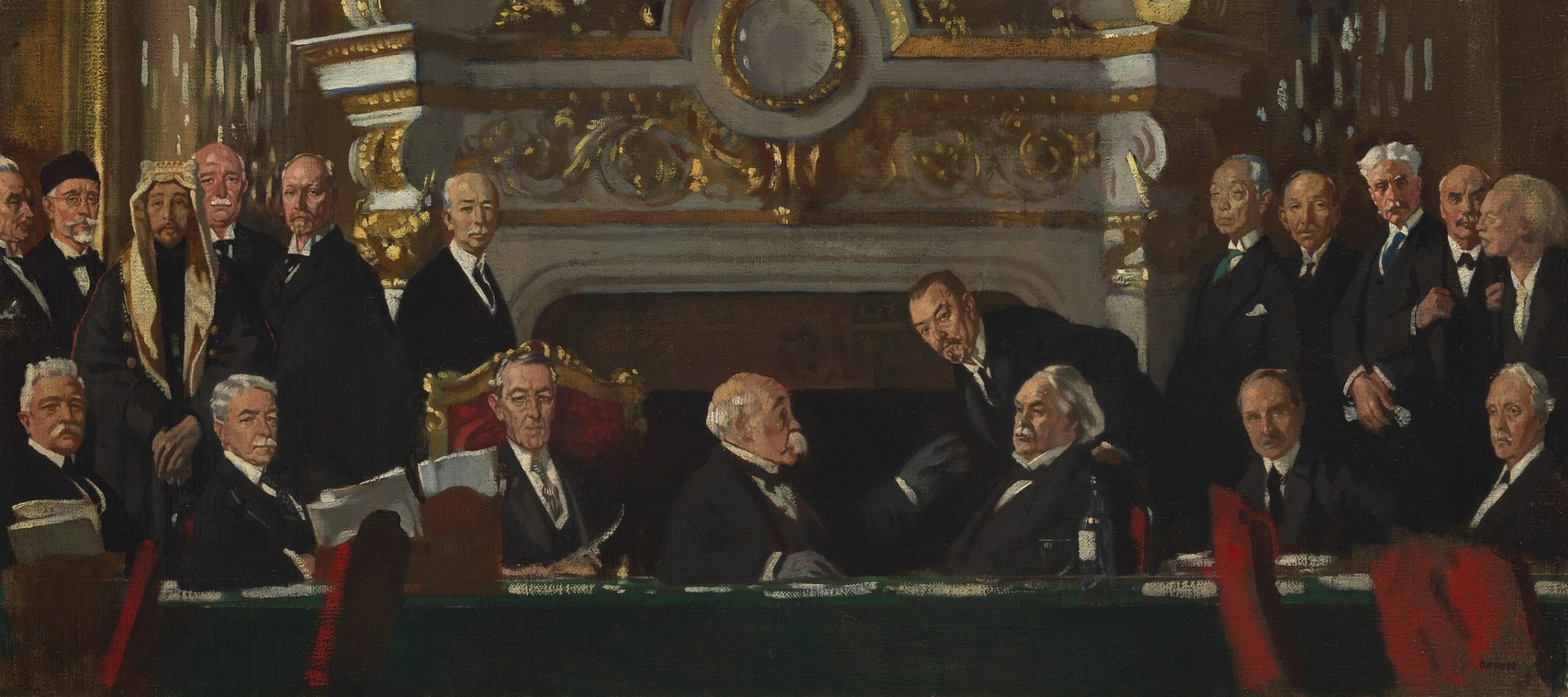
Detail of “A Peace Conference at the Quai d’Orsay” by William Orpen.
In September 1919, after the signing of the Treaty of Versailles in June, Wilson set out on a fiercely intense train trip across the United States to rouse public support for the Treaty and League, even as the Republican Senate threatened to withhold its approval. The trip would destroy Wilson’s health. He would collapse in Colorado on September 25 and suffer a stroke back in Washington. The rhetoric of his speeches in September explicitly formulated the war and the peace as a problem of enslavement and emancipation. At Balboa Park Stadium in San Diego on September 19, 1919, he declared that “the heart and center of this treaty is that it sets at liberty people all over Europe and in Asia who have hitherto been enslaved by powers which were not their rightful sovereigns and masters,” and he affirmed, accordingly, that “enslaved peoples ought to be freed.”[16] This was the culmination of his rhetorical and ideological reconception of the war and the peace.
Although Wilson offered a universal vision in the San Diego speech, applying the principle of emancipation to “people all over Europe and in Asia”—the evolution of his thinking clearly indicates that he derived his general conception of the people of Europe and Asia from considering the peoples of the Habsburg and Ottoman Empires. Beginning with his Gladstonian aversion to the Ottoman Empire and proceeding with his development of an analogy to the Habsburg monarchy, Wilson evolved a mental mapping of Eastern Europe as the domain of enslaved peoples awaiting emancipation. This vision was to be translated into a modern geopolitical mapping of the region as a set of interlocking national states. While the Wilsonian “solution” to post-Habsburg geopolitical space was not necessarily more internationally stable, nationally tolerant, or politically democratic than the former monarchy itself had been, the model of national self-determination was affirmed across the twentieth century in spite of the violent subversions of Hitler and Stalin. The new proliferation of national states in Eastern Europe following the conclusion of the Cold War brought about the dissolution of two crucial post-Habsburg Wilsonian projects—Czechoslovakia and Yugoslavia—while nevertheless maintaining the principle and rhetoric of emancipatory national legitimation that Wilson himself had come to embrace with reference to the end of the Habsburg monarchy.
Author Biography
Larry Wolff is the Julius Silver Professor of European History at NYU, the executive director of the NYU Remarque Institute, and the co-director of NYU Florence at Villa La Pietra. His books include Inventing Eastern Europe: The Map of Civilization on the Mind of the Enlightenment (1994), Child Abuse in Freud’s Vienna: Postcards from the End of the World (1995), Venice and the Slavs: The Discovery of Dalmatia in the Age of Enlightenment (2001), The Idea of Galicia: History and Fantasy in Habsburg Political Culture (Stanford 2010), and The Singing Turk: Ottoman Power and Operatic Emotions on the European Stage (2016). His latest book is Woodrow Wilson and the Reimagining of Eastern Europe (2020). He writes regularly about opera and is a member of the American Academy of Arts and Sciences.
Further Reading
Wolff, Larry. Woodrow Wilson and the Reimagining of Eastern Europe. Stanford, CA: Stanford University Press, 2020.
Notes
[1] On Wilson’s Habsburg policy see Victor Mamatey, The United States and East Central Europe, 1914-1918: A Study in Wilsonian Diplomacy and Propaganda (Princeton: Princeton University Press, 1957); Nicole Phelps, U.S.-Habsburg Relations from 1815 to the Paris Peace Conference (Cambridge: Cambridge University Press, 2013), pp. 219-73; and Larry Wolff, Woodrow Wilson and the Reimagining of Eastern Europe (Stanford University Press, 2020), pp. 56-114.
[2] Sigmund Freud and William Bullitt, Thomas Woodrow Wilson, Twenty-eighth President of the United States: A Psychological Study (Boston: Houghton Mifflin, 1966), pp. 82-85.
[3] William Ewart Gladstone, Bulgarian Horrors and the Question of the East (London: John Murray, 1876), p. 31.
[4] Diary of Colonel House, 18 December 1912, in The Papers of Woodrow Wilson, ed. Arthur Link, 69 volumes (Princeton: Princeton University Press, 1966-1994), Vol. 25, p. 610.
[5] Diary of Colonel House, 3 January 1917, The Papers of Woodrow Wilson, Vol. 40, p. 404.
[6] Baron de Moncheur to Baron de Broqueville, 14 August 1917, on meeting with Wilson on 13 August 1917, The Papers of Woodrow Wilson, Vol. 43, p. 469.
[7] Diary of Colonel House, 13 October 1917, The Papers of Woodrow Wilson, Vol. 44, pp. 378-79.
[8] Wilson, Annual Message on the State of the Union, 4 December 1917, The Papers of Woodrow Wilson, Vol. 45, pp. 197-99.
[9] Ibid.
[10] Ibid.
[11] Wilson, The Fourteen Points Address, 8 January 1918; The Papers of Woodrow Wilson, Vol. 45, pp. 481-85, 514-15, 536-37.
[12] Wilson to Frank Lyon Polk, 23 January 1918, The Papers of Woodrow Wilson, Vol. 46, pp. 82-83.
[13] Wilson, Address to a Joint Session of Congress (“Four Points” [Four Principles]), 11 February 1918, The Papers of Woodrow Wilson, Vol. 46, pp. 320-23.
[14] Ibid.
[15] Wilson, Address at Metropolitan Opera House, 4 March 1919, The Papers of Woodrow Wilson, Vol. 55, pp. 414-15.
[16] Wilson, Address in San Diego, 19 September 1919, The Papers of Woodrow Wilson, Vol. 63, pp. 372-73.
Published on December 7, 2021.
